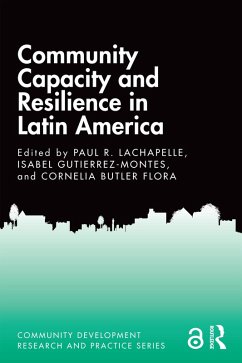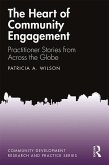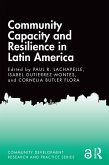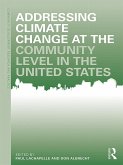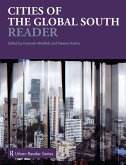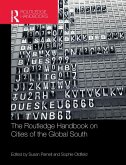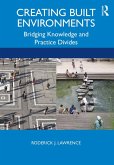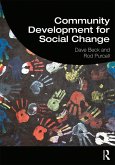Community Capacity and Resilience in Latin America (eBook, PDF)
Redaktion: Lachapelle, Paul R.; Flora, Cornelia Butler; Gutierrez-Montes, Isabel
39,95 €
39,95 €
inkl. MwSt.
Sofort per Download lieferbar

20 °P sammeln
39,95 €
Als Download kaufen

39,95 €
inkl. MwSt.
Sofort per Download lieferbar

20 °P sammeln
Jetzt verschenken
Alle Infos zum eBook verschenken
39,95 €
inkl. MwSt.
Sofort per Download lieferbar
Alle Infos zum eBook verschenken

20 °P sammeln
Community Capacity and Resilience in Latin America (eBook, PDF)
Redaktion: Lachapelle, Paul R.; Flora, Cornelia Butler; Gutierrez-Montes, Isabel
- Format: PDF
- Merkliste
- Auf die Merkliste
- Bewerten Bewerten
- Teilen
- Produkt teilen
- Produkterinnerung
- Produkterinnerung

Bitte loggen Sie sich zunächst in Ihr Kundenkonto ein oder registrieren Sie sich bei
bücher.de, um das eBook-Abo tolino select nutzen zu können.
Hier können Sie sich einloggen
Hier können Sie sich einloggen
Sie sind bereits eingeloggt. Klicken Sie auf 2. tolino select Abo, um fortzufahren.

Bitte loggen Sie sich zunächst in Ihr Kundenkonto ein oder registrieren Sie sich bei bücher.de, um das eBook-Abo tolino select nutzen zu können.
Community Capacity and Resilience in Latin America addresses the role of communities in building their capacity to increase resiliency and carry out rural development strategies in Latin America.
- Geräte: PC
- ohne Kopierschutz
- eBook Hilfe
- Größe: 6.34MB
Andere Kunden interessierten sich auch für
![The Heart of Community Engagement (eBook, PDF) The Heart of Community Engagement (eBook, PDF)]() Patricia WilsonThe Heart of Community Engagement (eBook, PDF)40,95 €
Patricia WilsonThe Heart of Community Engagement (eBook, PDF)40,95 €![Community Capacity and Resilience in Latin America (eBook, ePUB) Community Capacity and Resilience in Latin America (eBook, ePUB)]() Community Capacity and Resilience in Latin America (eBook, ePUB)39,95 €
Community Capacity and Resilience in Latin America (eBook, ePUB)39,95 €![Addressing Climate Change at the Community Level in the United States (eBook, PDF) Addressing Climate Change at the Community Level in the United States (eBook, PDF)]() Addressing Climate Change at the Community Level in the United States (eBook, PDF)52,95 €
Addressing Climate Change at the Community Level in the United States (eBook, PDF)52,95 €![Cities of the Global South Reader (eBook, PDF) Cities of the Global South Reader (eBook, PDF)]() Cities of the Global South Reader (eBook, PDF)62,95 €
Cities of the Global South Reader (eBook, PDF)62,95 €![The Routledge Handbook on Cities of the Global South (eBook, PDF) The Routledge Handbook on Cities of the Global South (eBook, PDF)]() The Routledge Handbook on Cities of the Global South (eBook, PDF)62,95 €
The Routledge Handbook on Cities of the Global South (eBook, PDF)62,95 €![Creating Built Environments (eBook, PDF) Creating Built Environments (eBook, PDF)]() Roderick LawrenceCreating Built Environments (eBook, PDF)39,95 €
Roderick LawrenceCreating Built Environments (eBook, PDF)39,95 €![Community Development for Social Change (eBook, PDF) Community Development for Social Change (eBook, PDF)]() Dave BeckCommunity Development for Social Change (eBook, PDF)39,95 €
Dave BeckCommunity Development for Social Change (eBook, PDF)39,95 €-
-
-
Community Capacity and Resilience in Latin America addresses the role of communities in building their capacity to increase resiliency and carry out rural development strategies in Latin America.
Dieser Download kann aus rechtlichen Gründen nur mit Rechnungsadresse in A, B, BG, CY, CZ, D, DK, EW, E, FIN, F, GR, HR, H, IRL, I, LT, L, LR, M, NL, PL, P, R, S, SLO, SK ausgeliefert werden.
Produktdetails
- Produktdetails
- Verlag: Taylor & Francis eBooks
- Seitenzahl: 228
- Erscheinungstermin: 20. Mai 2020
- Englisch
- ISBN-13: 9781351619554
- Artikelnr.: 59499482
- Verlag: Taylor & Francis eBooks
- Seitenzahl: 228
- Erscheinungstermin: 20. Mai 2020
- Englisch
- ISBN-13: 9781351619554
- Artikelnr.: 59499482
- Herstellerkennzeichnung Die Herstellerinformationen sind derzeit nicht verfügbar.
Paul R. Lachapelle is Professor in the Department of Political Science at Montana State University-Bozeman, USA. His teaching and research spans many disciplines and practices, from community climate change resiliency to social impact investing to diversity, inclusion and social justice topics. His publications include the edited book in this current series, Addressing Climate Change at the Community Level (Routledge 2019) as well as journal articles on energy impacts in communities, democratic practice and local governance, and community visioning. He earned a Ph.D. (Forestry) at the University of Montana's College of Forestry and Conservation with a focus on natural resource policy and governance and serves as Editor of the Community Development Society Current Issues Book Series and member of the Board of Directors (and past-president) of the International Association for Community Development. Isabel Gutierrez-Montes is Colombian Biologist (Universidad Nacional de Colombia), with a master's degree in Natural Resources from CATIE and a Ph.D. in Rural Sociology from Iowa State University. Isabel works in Mesoamerica and South America using qualitative research methods as a diagnostic and planning tool in landscape management, assessment of vulnerability, implementation of farmer field schools, and socioenvironmental educational programs. She currently is the dean of CATIE (Tropical Agricultural Research and Higher Education Center) graduate school. In the past she has been the academic coordinator of the Environmental Socioeconomics Master's Program, Coordinator and Leader of the Mesoamerican Agroenvironmental Program (MAP) and Director of the Development and Conservation Academic Program (PAPDC) at CATIE, Costa Rica. In the academic field, she has been a principal advisor for the Ph.D. theses of three students and served on Ph.D. thesis committees for two students, as well as major professor for the master's theses of 46 students and master's thesis committees of 35 students. She has published books, book chapters and technical and scientific articles in English and Spanish. Cornelia Butler Flora is Charles F. Curtiss Distinguished Professor Emeritus of Sociology at Iowa State University and research professor at Kansas State University. Her doctorate is from Cornell University, specializing in the sociology of development and population studies. She served as Director of the Population Research Laboratory at Kansas State University, Chair of the technical committee of the Sustainable Agriculture and Natural Resource Management Collaborative Research Support Program, Head of the Department of Sociology at Virginia Polytechnic Institute and State University, and Director of the North Central Regional Center for Rural Development. She served as member of the board of directors of Consortium for Sustainable Development of the Andean Ecoregion and Winrock International and served as past president of the Rural Sociological Society, the Community Development Society and the Agriculture, Food and Human Values Society. She has been consultant for international organizations and foundations in Africa, Asia, Latin America, the United States and Canada. Her primary research interests are the intersections of human communities and agro-ecosystems and sustainable intensification in the context of climate change, with an emphasis on gender. She has taught courses and done research on rural development in Spain (as a Fulbright Professor) and Uruguay (including periods as a Fulbright Professor) as well as Argentina and Peru.
Chapter 1. Community Capacity and Resilience in Latin America through the
Community Capitals Lens
Chapter 2. Promoting Development and Conservation Practice in Latin America
and the Caribbean through CATIE Masters Program
Chapter 3. Building Local strategies for the adaptation to Climate Change
of Farming Livelihoods: Review of a Participatory Approach Applied in
Mesoamerica.
Chapter 4. Bioculturality and Transdisciplinarity: Two Paths for Reaching
Sustainability Through Community Capacity Building in Mexico
Chapter 5. Bonds of Faith for Community Change: New Actors in Rural
Community Development in El Salvador
Chapter 6. Evaluation on a Shoestring: One International Development
Organization's Experience Measuring Impact in Central America
Chapter 7. Using Community Capitals to Adapt to Environmental Challenges in
Rural Uruguay
Chapter 8. Using the Community Capitals Framework to Understand the
Potential for Inclusive Innovation: Three Case Studies of an Energy Project
in Peru
Chapter 9. Youth Development in Northern Nicaragua: An Empowerment
Perspective
Chapter 10. Reflection on Building Sustainable Resilience Solutions to
Achieve SDG 2 in Colombia
Community Capitals Lens
Chapter 2. Promoting Development and Conservation Practice in Latin America
and the Caribbean through CATIE Masters Program
Chapter 3. Building Local strategies for the adaptation to Climate Change
of Farming Livelihoods: Review of a Participatory Approach Applied in
Mesoamerica.
Chapter 4. Bioculturality and Transdisciplinarity: Two Paths for Reaching
Sustainability Through Community Capacity Building in Mexico
Chapter 5. Bonds of Faith for Community Change: New Actors in Rural
Community Development in El Salvador
Chapter 6. Evaluation on a Shoestring: One International Development
Organization's Experience Measuring Impact in Central America
Chapter 7. Using Community Capitals to Adapt to Environmental Challenges in
Rural Uruguay
Chapter 8. Using the Community Capitals Framework to Understand the
Potential for Inclusive Innovation: Three Case Studies of an Energy Project
in Peru
Chapter 9. Youth Development in Northern Nicaragua: An Empowerment
Perspective
Chapter 10. Reflection on Building Sustainable Resilience Solutions to
Achieve SDG 2 in Colombia
Chapter 1. Community Capacity and Resilience in Latin America through the
Community Capitals Lens
Chapter 2. Promoting Development and Conservation Practice in Latin America
and the Caribbean through CATIE Masters Program
Chapter 3. Building Local strategies for the adaptation to Climate Change
of Farming Livelihoods: Review of a Participatory Approach Applied in
Mesoamerica.
Chapter 4. Bioculturality and Transdisciplinarity: Two Paths for Reaching
Sustainability Through Community Capacity Building in Mexico
Chapter 5. Bonds of Faith for Community Change: New Actors in Rural
Community Development in El Salvador
Chapter 6. Evaluation on a Shoestring: One International Development
Organization's Experience Measuring Impact in Central America
Chapter 7. Using Community Capitals to Adapt to Environmental Challenges in
Rural Uruguay
Chapter 8. Using the Community Capitals Framework to Understand the
Potential for Inclusive Innovation: Three Case Studies of an Energy Project
in Peru
Chapter 9. Youth Development in Northern Nicaragua: An Empowerment
Perspective
Chapter 10. Reflection on Building Sustainable Resilience Solutions to
Achieve SDG 2 in Colombia
Community Capitals Lens
Chapter 2. Promoting Development and Conservation Practice in Latin America
and the Caribbean through CATIE Masters Program
Chapter 3. Building Local strategies for the adaptation to Climate Change
of Farming Livelihoods: Review of a Participatory Approach Applied in
Mesoamerica.
Chapter 4. Bioculturality and Transdisciplinarity: Two Paths for Reaching
Sustainability Through Community Capacity Building in Mexico
Chapter 5. Bonds of Faith for Community Change: New Actors in Rural
Community Development in El Salvador
Chapter 6. Evaluation on a Shoestring: One International Development
Organization's Experience Measuring Impact in Central America
Chapter 7. Using Community Capitals to Adapt to Environmental Challenges in
Rural Uruguay
Chapter 8. Using the Community Capitals Framework to Understand the
Potential for Inclusive Innovation: Three Case Studies of an Energy Project
in Peru
Chapter 9. Youth Development in Northern Nicaragua: An Empowerment
Perspective
Chapter 10. Reflection on Building Sustainable Resilience Solutions to
Achieve SDG 2 in Colombia
